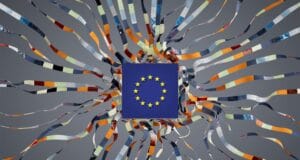This content was created by the Data Sharing Coalition, one of the founding partners of the CoE-DSC.
Our cities face major challenges. How can they remain liveable and accessible while their population continues to grow and the pressure on the environment increases day by day? Various organisations ranging from market parties, governments and research institutions to citizens’ initiatives try to come up with smart solutions for complex spatial, environmental and infrastructural challenges. Our participant WeCity believes it can take on the role as an intermediary that can stimulate cooperation between all parties and thereby make our cities smarter and more sustainable. Arjen Hof, CTO and co-founder of WeCity, will elaborate on WeCity’s mission during our Community Meeting on November 25th. We already spoke with him in advance.
Data sharing should be seen in a broad perspective, it should also include sharing of data about issues and performance to ultimately improve service and maintenance processes.
How data is used to make smart solutions
As a result of digitisation and new technology, large amounts of data are produced every day. According to Arjen, making that data available more effectively can make an important contribution to solving the major challenges cities face. “Take, for example, optimising the process of waste collection. Why does a garbage truck have to drive past all the underground garbage containers every single week if only half of them are full? Sensor technology can ensure that the route to be followed by that garbage truck is set more intelligently, so that it only drives past the containers that really need to be emptied. The solution could even become smarter by combining other data sources, such as weather information, events or road constructions.” There are countless other examples of smart solutions. “The ‘smart lamppost’ could be a good example,” says Arjen. “This lamppost could not only provide light, but can also function as a charging point for a car, measure air quality or detect vehicles through sensor technology. Besides, it reduces the number of individual assets in the street. However, it needs electricity and connectivity.”
How to stimulate large-scale use of smart solutions
Unfortunately, we still rarely see these kinds of solutions in practice. According to Arjen, an important reason is a lack of trust. “Collaborations in the field of smart solutions are difficult to scale and often end after creating a proof of concept or after finishing a small-scale pilot. This has many reasons. I generally see that organisations question whether their data can be shared in a safe and reliable manner. Besides, as smart solutions often consist of combined solutions of multiple organisations, collaboration itself is difficult. Providers end up in endless discussions about accountability, costs and maintenance.” According to Arjen, to stimulate the large-scale use of smart solutions, an intermediary is needed. “WeCity wants to take on that role,” Arjen explains: “Our goal is to provide consumers the very much needed trust to combine multiple solutions from different providers in a safe and reliable way. Therefore, providers that join WeCity must meet assessment criteria that build on existing (inter)national agreements, standards and certifications, with regards to data (sharing), data models and beyond (e.g. ISO). By doing that, we help help to create an open ecosystem that is built on trust and freedom of choice. With WeCity Service Management, we ensure that all providers that work together within WeCity adhere to the agreements made. As a neutral and independent party – we do not own the solutions, nor do we own the data that the solutions process – we can take care of the highly needed governance of these collaborations.”
Our WeCity Urban Platform helps providers to connect and provide access to each other’s data sources. However, it also provides other parties varying from the government, research institutions to startups access to this data – under control of the owner of the data – to develop new innovations based on these data. To further stimulate the large-scale use of smart solutions, WeCity tries to bring supply and demand closer together by developing the WeCity Catalogue, which showcases the various providers of smart solutions and all standards they meet. Together with these providers, WeCity also seeks cooperation with, for example, the government and universities. Arjen: “Snuffelfiets is a good example of a project in which we collaborate with among others the province of Utrecht, the National Institute for Public Health and the Environment (RIVM), the University of Utrecht and a mobile sensor provider. The mobile sensor is placed on a bicycle and can measure particulate matter to assess air quality. Research based on these measurements could provide insights into how, for example, the traffic flow in cities can be improved. Moreover, based on this research the government can develop new policies to, for example, create or change bicycle routes. In the end, a smart city is about how to make data usable, involve people and create a strong learning and collaborative community that can face the urban challenges of today and tomorrow.”
Cross-sectoral agreements on data sharing
WeCity joined the Data Sharing Coalition because it believes that cross-sectoral agreements on data sharing can accelerate smart solution collaborations. Arjen: “Before, for example, the smart lamppost can be installed in our streets, various stakeholders such as energy companies, telecom providers and the government agencies first need to find an answer a couple of questions: (1) which data is collected? (2) who owns the data? and (3) how can it be shared in a safe and controlled manner? In my opinion, data sharing should be seen in a broad perspective and should also include sharing of data about issues and performance to ultimately improve service and maintenance processes. Together with the Data Sharing Coalition, we are investigating whether we can develop a new use case around the smart lamppost. This will also provide new insights into the cross-sectoral agreements for data sharing that the Data Sharing Coalition is working on, ultimately removing the current data sharing barriers. As WeCity, we like to make a contribution and help to accelerate many more smart solutions.”
On November 25th, during our next Community Meeting, Arjen will further elaborate on WeCity’s activities with regards to data sharing. Do you want to attend this Community Meeting? Please send us an email: [email protected]




